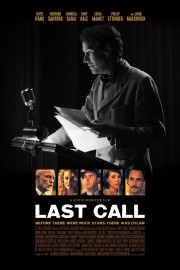Last Call
Steven Bernstein’s “Last Call” has had such a long birth to being released in theatres that, on the Letterboxd social media movie review site, it still goes by its original title, “Dominion.” That title comes from one of Dylan Thomas’s poems, but honestly, “Last Call” was a better choice, anyway. The film chronicles the poet’s final days in a kaleidoscope of fantasy, flashbacks, flash forwards, and key moments that are all the more compelling thanks to the fantastic lead performance by Rhys Ifans as Thomas. As a poet who views drinking as a way of life, and something essential to his mystique, Thomas takes that act of drinking as a creative process, one that he’s willing to share with the bartender, and even the other drinkers at the bar. It’s a richer experience than it sounds.
I’m not terribly familiar with Dylan Thomas as a person beyond having heard his most famous poem, “Do Not Go Gentle Into That Good Night,” as a constant motif in Christopher Nolan’s “Interstellar.” In Bernstein’s film, I’m still not entirely sure we get to know him much more, but how the writer-director frames Thomas’s life, in a reflection of his final days, is enough to get me interested in knowing more about him. The central arc of “Last Call” involves Thomas’s final hours; he is supposed to be preparing for a lecture at Vassar, but is, instead, in a bar, day-drinking, and musing about what one calls each, individual drink. Interspersed, we see scenes with he and his publicist (the very good Tony Hale), who wants Thomas to read his manuscript; we see his wife (Romola Garai), at home, writing him for more money; scenes of him giving discussions to adoring students; and finally, scenes with his doctor (John Malkovich), whom is seen seemingly during an autopsy, as well as with Hale’s publicist, waxing on about their charge.
Ifans’s performance is completely engrossing as Dylan Thomas. Every moment he is on screen, it’s impossible to not keep watching. The Thomas that Bernstein has written fits so well within Ifans’s personality that it’s like he was born to play the role. Just watch the moments he is in the bar, naming each drink he has, and we understand his thought process as an artist, and as an individual. To a degree, we empathize with him, but we do not sympathize with him. He has brought his fate upon himself, making the final moments of the film, with Hale and Malkovich discussing Thomas, darkly funny, in addition to a little emotional. This is worth checking out for one of the best performances of the year.










